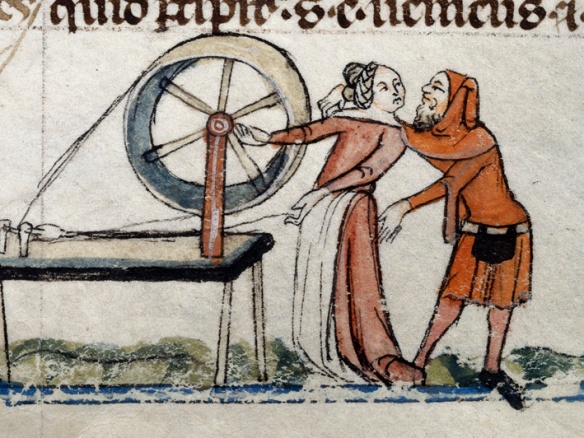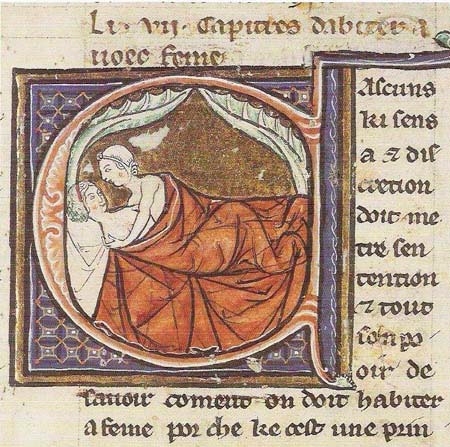Grazide Rives, a peasant girl from Montaillou lost her virginity to the local priest, Pierre Clergue in the year 1313. We have a detailed account of this from the Inquisition register of Jacques Fournier, bishop of Pamiers in Comte de Foix, southern France. Grazida was interrogated by him, which resulted in a verbatim record of what happened to her. He, later to become Pope Benedict XII, and referred to as a clodhopper by Petrarch, was, fortunately, a meticulous note-taker. Because of this we have one of the very rare insights into the life of the medieval peasant.

Man accosting a woman at the loom: Smithfield Decretals, Southern France, late 13th — early 14th Century. British Library, Royal MS 10E
Montaillou, in the Pyranees, at that time, had a population of little more than 200. It was a community of mainly peasant farmers, labourers and shepherds. The Comte de Foix was the feudal overlord of the pyranean principality that included Montaillou. In Montaillou the interests of the house of Foix was looked after by a chatelain and a bayle(bailiff). There was little distinction between these minor officials and the peasants and to a large extent Montaillou was left to its own devices as long as it paid its taxes and tithes.
Pierre Clergue, the priest, was the power behind the most dominant family in the village. He was a seducer and incorrigible womaniser with at least a dozen mistresses. It appears not to have been such a great scandal. The villagers, men and women, were well aware of his activities and endured them or, in some cases, welcomed them. Pierre was ruthless in his unquenchable desire for women. If a woman resisted him he would intimidate her by threatening to report her to the inquisition. The inquisition, at that time was trying to stamp out Catharism which was endemic in the region.
The young girl Grazide Rives gave a very frank account of her liason with Pierre Clergue:
“The priest came to my mother’s house while she was out harvesting, and was very pressing: ‘Allow me,’ he said, ‘ to know you carnally. And I said, ‘All right.’
At that time, I was a virgin. I think I was fourteen or fifteen years old. He deflowered me in the barn in which we kept the straw. But it wasn’t rape at all.”
Grazide went on to say that the priest continued to know her carnally, even after he had given her as a wife to an old peasant called Pierre Lizier. Both Grazide’s husband and her mother knew that the priest was having sex with her and both consented to it. The sexual encounters happened mostly during the day in the mother’s house. Grazide’s husband, Pierre, would say, ‘has the priest done it with you?’ and Grazide would answer ‘Yes.’ To which Pierre would say ‘as far as the priest is concerned, all right! But don’t you go having other men.’
Grazide on being questioned about her attitude to her sexual relationship with the priest said : ‘with Pierre Clergue, I liked it. And so it could not displease God. It was not a sin.’ This is an interesting view from a poorly educated girl but it is not an uncommon view. Master Ermengaud’s Breviaire d’Amour and Flamenca express the very same idea: ‘A lady who sleeps with a true lover is purified of all sins … and the joy of love makes the act innocent.’

Couple in bed: Aldobrandino of Siena’s le Regime de Corps, Lille, ca. 1285.
British Library, MS Sloane 2435 fol. 9v
It would certainly appear that there was a considerable degree of sexual tolerance amongst some of our medieval ancestors. As we can see from this story from Montaillou, the Catholic religion and its priest was no deterrent to liberal sexual attitudes. Licentious behaviour of Catholic clergy was widespread in the 14th century. This is one reason why Catharism was widely accepted and it’s parfaits (monks who professed to be Cathars) admired for living true Christian lives of prayer and poverty.
